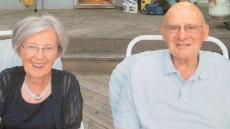OTTAWA —Members of the medical community and front-line soldiers in Canada's opioid crisis are pressing the federal government to declare a national public health emergency.
Dr. David Juurlink, head of pharmacology and toxicology at Toronto's Sunnybrook Health Sciences Centre, says the opioid problem is so dire it demands an urgent response at the highest levels of government.
Politicians are meeting with public health experts, doctors and family members who have lost loved ones at a two-day summit in Ottawa to hash out a solution to escalating — and deadly — rates of drug addiction.
Juurlink says declaring a public health emergency would empower chief medical officers to take the actions necessary to reduce harm.
The federal NDP is calling on the federal government to do the same.
The two-day meeting is being co-chaired by federal Health Minister Jane Philpott and Ontario Health Minister Eric Hoskins, both of whom are doctors themselves.

Declaring an emergency "takes out of the political realm the singular job of protecting public health and gives it to the people who are tasked with and empowered to do that," Juurlink said.
There is clear consensus that leadership and effective co-ordination at the federal level would have a major impact on reducing overdose deaths in Canada, said NDP health critic Don Davies.
"We urge the federal government to take immediate action to help save lives," he said in a statement.
Hoskins said the summit reinforces the need for leadership right across the country to confront Canada's opioid issue.
"By working together to develop a national response to this crisis, we have an incredible opportunity to pool our knowledge, our experiences and the lessons learned and help to save the lives of people across this country suffering from opioid addiction," Hoskins said Friday.

It is not lost on the federal government that Canadians are dying everyday due to opioid use and abuse, Philpott said, noting a pan-Canadian approach is required to address the issue.
"We are not going to solve this today," she said. "We are not going to solve it in a single stroke. This is going to take repetitive work and it is going to take work on the part of every one of us here."
Philpott has admitted she is unhappy with a lack of data and surveillance programs that could shed light on how many opioids are prescribed, where they are coming from and how many people are overdosing and dying.
Canada has the world's second-highest per capita consumption of prescription opioids, said Philpott, noting that in some parts of the country, drug overdoses are killing more people than motor vehicle accidents.
B.C. Premier Christy Clark is also pressing Ottawa to take steps to stop the flow of fentanyl from China — a drug that prompted that province to declare a public health emergency last spring.
Public Safety Minister Ralph Goodale said Thursday the issue demands international co-operation, as well as additional personnel and technology on the domestic front.





